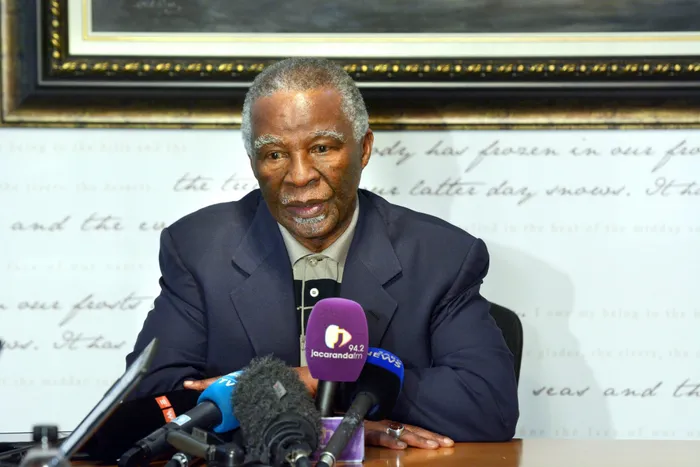Thabo Mbeki defends “Kill the Boer” chant, says it’s not meant literally

Former President Thabo Mbeki he defended the historical context of the "Kill the Boer" chant.
Image: Karen Sandison
Former president Thabo Mbeki defended the controversial “Kill the Boer” chant — widely sung by Economic Freedom Fighters (EFF) leader Julius Malema — saying it was a symbolic expression rooted in the anti-apartheid struggle and not a literal call to violence.
Mbeki said the chant, used during the liberation struggle, was never intended to be taken literally and remains misunderstood by critics.
“It’s unchanged. I mean, that thing is a chant. It was a chant during the days of struggle,” Mbeki said in an interview with SABC News.
“Chants of that kind in our tradition, in the African tradition, you don’t take them literally.”
To illustrate the cultural context, Mbeki referred to his testimony before the Truth and Reconciliation Commission (TRC), where he sang a traditional chant, “Ngeke ngiye kwaZulu, kwa feli umama (“I won’t go to Zululand because my mother died there”).
“You sing, you say, but you don’t mean that literally,” Mbeki explained. “It’s a chant, and it’s meant to motivate people.”
Regarding the controversial line “Kill the Boer, kill the farmer,” Mbeki said the African National Congress (ANC) never endorsed violence against civilians.
"There’s no MK (uMkhonto we Sizwe) soldier who was ever instructed to go and kill a farmer just because they are Boer,” he said.
“In the context of war, they (soldiers) engage other soldiers, not civilians.”
He added that those who portray the chant as a literal call to violence are exaggerating for political purposes.
Mbeki’s comments follow remarks by US President Donald Trump, who recently called for Malema’s arrest during a meeting with South African President Cyril Ramaphosa at the White House.
His comments were partly based on a video clip of Malema speaking in Parliament about land reform.
Democratic Alliance (DA) leader John Steenhuisen, who was present at the meeting, told Trump and senior US officials that his party joined South Africa’s Government of National Unity (GNU) to prevent extremist parties, including the EFF and uMkhonto weSizwe, from gaining power.
Trump’s comments further escalated already strained diplomatic ties between Washington and Pretoria, particularly regarding South Africa’s land reform policy, which Trump described as the “seizure of land” from white farmers, a claim the South African government has denied.
Lobby group AfriForum has long opposed the chant, accusing Malema of inciting racial hatred.
Malema has continued to sing the song at public rallies and has faced backlash for supporting land invasions.
In March, Trump again criticised Malema after Elon Musk posted on X (formerly Twitter) accusing a South African political party of promoting “white genocide.” Trump shared the post on his Truth Social platform, earning praise from AfriForum CEO Kallie Kriel.
That same month, the Constitutional Court dismissed AfriForum’s bid to have the chant banned, ruling that the case had no reasonable prospect of success.
“There are so many people killed in South Africa, and the majority of them are Black. There is no white genocide in South Africa,” he said.
Malema dismissed Trump’s claims that mass graves of white South Africans exist, accusing the US president of showing Ramaphosa a photo taken in the Democratic Republic of Congo and falsely claiming it was from South Africa.
“There are no graves like that in South Africa,” Malema said. “That picture does not belong to us.”
He added that Trump asked Ramaphosa, “Why is Julius Malema not in jail?” and criticised the president for not defending the court’s ruling.
“This song was approved by the Constitutional Court,” Malema said.
“We are a constitutional democracy. We must defend the decisions of the court.”
After his address, Malema concluded by singing the controversial “Kill the boer” chant.
simon.majadibodu@iol.co.za
IOL Politics